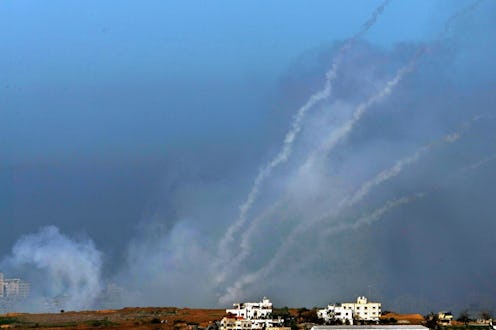
On Thursday evening, the United States announced it had launched missiles aimed at Syria in response to Tuesday's deadly chemical attacks on civilians in the northern part of the country. According to NBC News, U.S. officials confirmed that at least 50 tomahawk missiles were directed towards a point in west Syria called Ash Sha'irat. Until now, the Trump administration has avoided involvement in Syria. Following the gas attack, that all changed as pressure mounted from the public and international community to take action against what's being considered an attack on humanity.
As the Associated Press noted, this is Trump's most "dramatic" military move since becoming president. Whether or not it will entail further U.S. involvement in Syria is unknown. The United States supposedly targeted the same airbase from where the aircraft carrying the deadly chemical gas were launched on Tuesday. U.S. officials believe the Assad regime is responsible for dropping the chemical gas on his own people, though the regime has denied involvement. According to Turkey's health ministry, who conducted autopsies on some of the victims, the gas is a nerve agent known as sarin.
On Thursday, Trump told reporters that something might happen, but he didn't announce the airstrikes before they were launched.
"I think what happened in Syria is a disgrace to humanity," he said. "He's there, and I guess he's running things, so something should happen."
That same day, during a press conference, Secretary of State Rex Tillerson had a more telling announcement to make. "Assad's role in the future is uncertain and with the acts that he has taken, it would seem that there would be no role for him to govern the Syrian people," he said. Tillerson also urged the international community to become involved in attempting to oust Assad.
Following the attack, Trump called upon other "civilized nations" to join in putting an end to the violence in Syria, which has been happening for over six years. He also added that the missile launch is, at this point, in the United States' "vital national security interest."
The civil war in Syria is a complex one, which surely accounts for why the United States has largely resisted involvement up until this point. For example, Russia has continued to support Assad's regime, even after the gas attack, putting its allies potentially at odds with the United States and any other countries that work to throw Assad out of power. Regardless of the conflict's intricacies, hopefully the U.S. airstrike encourages other nations to join the fight against the ongoing bloodshed in Syria.